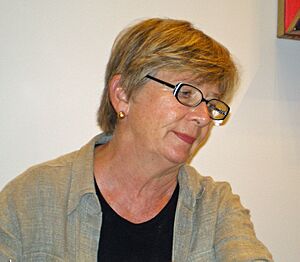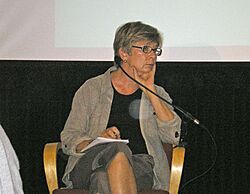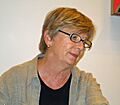Barbara Ehrenreich facts for kids
Quick facts for kids
Barbara Ehrenreich
|
|
|---|---|

Ehrenreich in 2006
|
|
| Born | Barbara Alexander August 26, 1941 Butte, Montana, U.S. |
| Died | September 1, 2022 (aged 81) Alexandria, Virginia, U.S. |
| Occupation |
|
| Education | |
| Genre | Nonfiction, investigative journalism |
| Spouse |
John Ehrenreich
(m. 1966; div. 1977)Gary Stevenson
(m. 1983; div. 1993) |
| Children |
|
Barbara Ehrenreich (born Barbara Alexander; August 26, 1941 – September 1, 2022) was an American writer and activist. She was known for her strong opinions on social issues. During the 1980s and early 1990s, she was a key member of the Democratic Socialists of America. She wrote many popular articles and essays. She also wrote 21 books. Ehrenreich is most famous for her 2001 book, Nickel and Dimed: On (Not) Getting By in America. In this book, she wrote about her three-month experience trying to live on minimum-wage jobs. She received important awards like the Lannan Literary Award and the Erasmus Prize.
Contents
Early Life and Education
Barbara Ehrenreich was born in Butte, Montana. She described her hometown as a busy mining town. Her parents were strong supporters of unions. They taught her two main rules: never cross a picket line (meaning, don't work during a strike) and never vote Republican. She also said her family was atheist, meaning they did not believe in God.
When she was a child, she sometimes worried about her parents' beliefs. Her mother was a liberal Democrat who cared deeply about fairness for all people. Her father was a copper miner who later became a business executive. Her family moved several times, living in Pittsburgh, New York, and Massachusetts, before settling in Los Angeles.
Ehrenreich first studied physics at Reed College. She then switched to chemistry and graduated in 1963. Later, she earned her PhD in cellular immunology from Rockefeller University in 1968.
In 1970, she had her daughter, Rosa. This experience made her a feminist. She saw how women were treated in healthcare and felt angry about it.
Career as a Writer and Activist
After getting her PhD, Ehrenreich chose not to work in science. Instead, she became a writer and activist. She worked on health policy and taught at a university.
In the 1970s, she focused on women's health. She wrote several books with fellow feminist Deirdre English. She also spoke often about women's rights and social justice.
Ehrenreich became a well-known freelance writer. She wrote articles, book reviews, and social commentary for many major magazines and newspapers. These included The New York Times, Time, and Mother Jones.
She also helped start or advise many organizations. These groups worked on women's health, mental health, and workers' rights. She was a board member for the National Writers Union and the Democratic Socialists of America.
Nickel and Dimed and Other Works
In 2001, Ehrenreich published her most famous book, Nickel and Dimed: On (Not) Getting By in America. For this book, she worked "undercover" in low-wage jobs. She was a waitress, a housekeeper, and a Wal-Mart employee. She earned about $7 per hour. Her goal was to see if someone could live on minimum wage in the United States. She found that it was impossible to pay for food and rent with just one low-paying job. The book became a bestseller. Many people see it as an important book about social fairness.
After Nickel and Dimed, Ehrenreich started the Economic Hardship Reporting Project. This group helps support journalists who write about the struggles of working-class people.
In 2009, she wrote Bright-sided: How Positive Thinking Is Undermining America. In this book, she looked into the rise of the "positive thinking" industry. She shared her own experience after being diagnosed with breast cancer. She questioned if always being positive was truly helpful.
Awards and Recognition
Barbara Ehrenreich received many awards for her writing and activism:
- In 1980, she won a National Magazine Award for a story about dangerous products sold overseas.
- In 1998, she was named "Humanist of the Year" by the American Humanist Association.
- In 2000, she received the Sidney Hillman Award for her article "Nickel and Dimed."
- In 2002, she won another National Magazine Award for her essay "Welcome to Cancerland." This essay described her own experience with breast cancer. She wrote about what she called the "breast cancer cult."
- In 2004, she received the Puffin/Nation Prize for Creative Citizenship. This award honors Americans who challenge the way things are.
- In 2007, she received the "Freedom from Want" Medal from the Roosevelt Institute. This award celebrates people who work for the "Four Freedoms" that President Roosevelt spoke about.
- She also received grants from the Ford Foundation, Guggenheim Fellowship, and John D. and Catherine T. MacArthur Foundation.
- In 2018, she received the Erasmus Prize from the King of the Netherlands. This was for her work in investigative journalism.
Personal Life
Barbara Ehrenreich was married and divorced twice. She had two children with her first husband, John Ehrenreich. Her daughter, Rosa Brooks, is a law professor and writer. Her son, Ben Ehrenreich, is also a novelist and journalist.
Ehrenreich was diagnosed with breast cancer after her book Nickel and Dimed came out. This led to her famous article "Welcome to Cancerland."
Barbara Ehrenreich lived in Alexandria, Virginia. She passed away on September 1, 2022, at the age of 81, after having a stroke. Her obituary in The New York Times called her an "Explorer of Prosperity's Dark Side." This was because she often wrote about unfairness and inequality in America.
Books

Nonfiction
- (with John Ehrenreich)
- (with John Ehrenreich and Health PAC)
- (with Deirdre English)
- (with Deirdre English)
- (with Deirdre English)
- (with Elizabeth Hess and Gloria Jacobs)
- (with Fred L. Block, Richard A. Cloward, and Frances Fox Piven)
- (ed., with Arlie Hochschild)
- (UK: Smile Or Die: How Positive Thinking Fooled America and the World)
Essays
- "The Charge: Gynocide", Mother Jones, November/December issue, 1979
- "Making Sense of La Difference", Time, 1992
- "Burt, Loni and Our Way of Life", Time, September 20, 1993
- "In Defense of Talk Shows", Time, December 4, 1995
- "The New Creationism: Biology Under Attack" The Nation, June 9, 1997
- ", Time, January 31, 2000
- "Welcome to Cancerland", 2001 National Magazine Award finalist
- "A New Counterterrorism Strategy: Feminism", AlterNet, 2005
- "Fight for Your Right to Party" Time, December 18, 2006
- , The Guardian, February 22, 2009
- "Is It Now a Crime to Be Poor?", The New York Times, August 9, 2009
- "Are Women Getting Sadder? Or Are We All Just Getting a Lot More Gullible?", Guernica, October 13, 2009
- "Smile! You've got cancer", The Guardian, January 2, 2010
- Death of a Yuppie Dream – The Rise and Fall of the Professional-Managerial Class February 12, 2013.
Images for kids
-
Ehrenreich at a New York Times discussion
 | Jackie Robinson |
 | Jack Johnson |
 | Althea Gibson |
 | Arthur Ashe |
 | Muhammad Ali |



